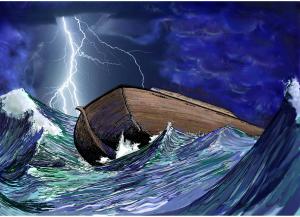Issue Date: August 1, 2003
By GENE MOORE The storm that we of the church are going through has made me think of other storms I have experienced. My most difficult were in the Pacific during World War II on an LST, a flat-bottomed vessel used to land troops and cargo on open beaches. Our ship survived seven typhoons. Just imagine facing 60-foot seas, winds steady at 70 mph, gusting to 120, and an inability to steer a course. The rain falls horizontally, and so fast that it beats a tattoo on your face. At its maximum roll it hangs on momentarily making you wonder if it will continue to roll or tilt back the other way. Then imagine a twist as the bow dips under water scooping up tons of seawater. Next the stern is caught by the swell and your engines spin uselessly as the propellers come out of the water. Bad as those typhoons were, a far worse storm hit Admiral William Halsey’s Third Fleet in December 1944. It got me to re-reading Typhoon: The Other Enemy by Capt. C. Raymond Calhoun, U.S. Navy (Retired). He details the events about the disastrous December 1944 typhoon in the Pacific during World War II. That storm badly damaged Admiral Halsey’s Third Fleet. The worst damage was that three destroyers turned over and sank with the loss of more than 700 men. In addition there was much damage done to aircraft carriers, battleships and other smaller ships. Both the author and Admiral Chester Nimitz blamed the loss on captains of ships blindly following Halsey’s commands. Nimitz insisted that good seamanship required each captain to decide for himself when the conditions were so dangerous for his ship that he needed to break formation and ensure the safety of the ship even if it meant disobeying the commanding admiral’s orders. Halsey had insisted for too long that the ships remain in formation despite the worsening weather. Nimitz’s report said: Fleet damage and losses were accentuated by the efforts of vessels and subordinate commanders to maintain fleet courses, speeds, and formations during the storm. Commanding officers failed to realize sufficiently in advance of the fact that it was necessary for them to give up the attempt, and give all their attention to saving their ships. There was lack of appreciation by subordinate commanders and commanding officers that really dangerous weather conditions existed, until it was too late to make the preparations for security that might have been helpful. His words got me to thinking about the current crisis in the church. One of my dear friends had a son who was molested by Fr. James Porter, an early abuser. My friend went to a much-beloved pastor in another parish and told him about the abuser. The priest said, “I know he is abusing, but what can I do about it?” He suggested that my friend go to another pastor, a local monsignor. The monsignor said, “I know, but what can I do about it?” Much of the news coverage of the scandal focuses on Cardinal Bernard Law and other bishops knowing about the abusers, yet transferring them from parish to parish. My friend’s story awoke me to the significant involvement of lesser clerics in not acting before the storm got worse. I wish that the two pastors noted above, and other priests as well, had been aware of Nimitz’s conclusion about the storm and leadership responsibility: In conclusion, both seniors and juniors must realize that in bad weather, as in most other situations, safety and fatal hazard are not separated by any sharp boundary line, but shade gradually from one into the other. There is no little red light which is going to flash on and inform commanding officers or higher commanders that from then on there is extreme danger from the weather, and that measures for ships’ safety must now take precedence over further efforts to keep up with the formation or to execute the assigned task. This time will always be a matter of personal judgment. Naturally no commander is going to cut thin the margin between staying afloat and foundering, but he may nevertheless unwittingly pass the danger point even though no ship is yet in extremis. … The time for taking all measures for a ship’s safety is while still able to do so. Nothing is more dangerous than for a seaman to be grudging in taking precautions lest they turn out to have been unnecessary. Safety at sea for a thousand years has depended on exactly the opposite philosophy. If all priests and lay people had observed Nimitz’s words, our storm, our church’s typhoon, would have passed more safely and quickly. Gene Moore is retired and writes a bi-weekly column for The Sun Chronicle of Attleboro, Mass. National Catholic Reporter, August 1, 2003 |
